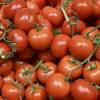Meteorologist Dave Epstein is our go-to person for pressing weather questions on everything from winter blizzards to summer droughts. He’s also a horticulturist, meaning he’s an expert in anything that grows leaves and flowers. GBH's Morning Edition asked our audience for weather and gardening questions, and Epstein graciously answered them on the air. This transcript has been edited for clarity.
Have a gardening or weather question for meteorologist Dave Epstein? Tweet him
@GrowingWisdom
, email us at
thewakeup@wgbh.org
, or text 617-300-2008.
"I have too many holes in my pepper plants — not sure what they are and [how] to treat it. The plants look in stress." —Neha
"I’m trying to treat, but wonder if the rain simply washes away before it can help. I hate to do too often. I hate to have even the organic stuff wash onto lawns where birds may ingest. Is there a rule of thumb on how to do this when it rains every 18-36 hours?" —Cindy
Pests, slugs and other critters who will create tiny holes in backyard produce patches are thriving this year, Epstein said.
“There are a lot of pests out there,” he said. “I think slugs are becoming a big problem because of all the moisture.”
He suggested looking into organic slug granules or pellets.
“You want to put some of those pellets around, not on the plants,” he said. “Neem oil products are really great organic products.”
Those products can indeed get washed away in heavy rain, Epstein said.
“You do have to reapply after heavy rain,” he said. “If you read the back of the labels, most of them say reapply every 7 to 14 days, depending on the product or after heavy rain.”
Epstein’s tip: The best time to apply those products is early in the morning or late at night, when the sun is not beaming as strongly.
“Two of the very large oak trees on our property are dropping many immature, green acorns. We’re thinking they’re in distress of some sort. We’ve had lots of rain in our area so far this year but last year was really rough with the drought. Is this what’s causing the distress? Is there anything we can do for these great shade trees near our house?” — Alice and Bob in Wilmington
No reason to worry, Epstein said. The oak tree is having what’s called a mast year.
“Oak trees, every two to three years, produce an abundance of acorns. And this is going to be a massive year for a lot of the trees,” Epstein said. “I noticed the same thing. I've got a big oak tree right next to me. It's already dropping some of the little ones.”
During mast years, trees produce so many acorns that its branches cannot support the full yield, he said.
“It's super happy, but it's saying, 'all right, I'm going to get rid of some of these because I need to let more mature.' It can't let all of them mature,” Epstein said. “It’s a normal process. So don't worry. But be prepared for a lot of acorns on the ground in late summer.”
“I feel like the seasons have shifted by about three weeks. Do you notice this in your records? Specifically, dew points, frost dates, etc.? September seems like my best gardening month in terms of rose, zinnia and cosmo blooms.” —Colleen
Yes, Epstein, too, has noticed the shift in conditions.
And because our region is getting more hot days in June, July and August, Epstein said, plants that prefer cooler nights are blooming in September.
“As the climate has continued to change over the past several decades, we noticed that the last frost date in the spring is now occurring earlier and the first frost date in the fall is occurring later,” he said. “So we're kind of widening the growing season.”
“I have a very healthy hydrangea plant (third year) in the ground getting plenty of sun and still no buds on it. Do I need to fertilize it?”—Kathleen
Alas, this is not the year for hydrangea blooms in Massachusetts. Their blooms are formed in August, sit out all winter, and blossom the following year, which means a mild winter with one really cold snap can destroy them.
“That big cold we had in February took a lot of the blossoms off the hydrangeas and killed them,” Epstein said. “So they'll have to wait until next year. It's not going to hurt to give them a little bit of hydrangea fertilizer.”









